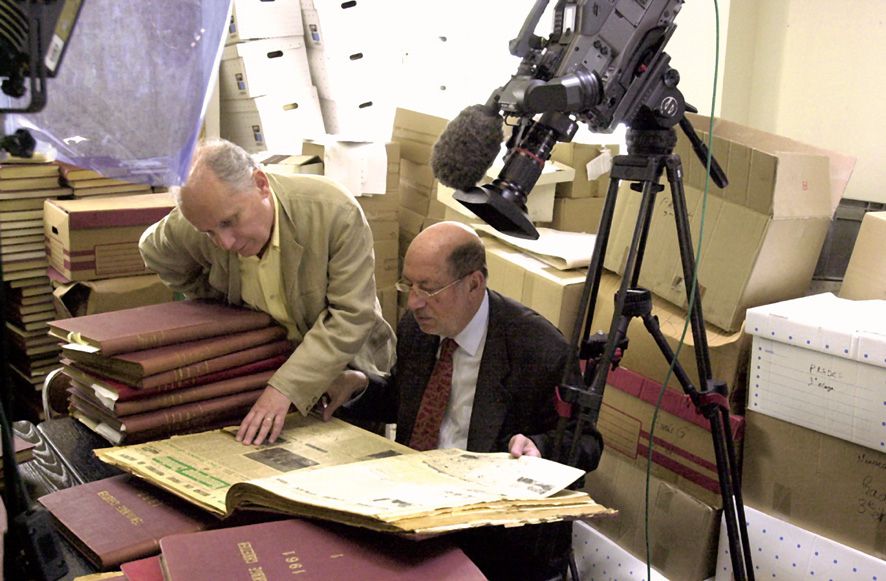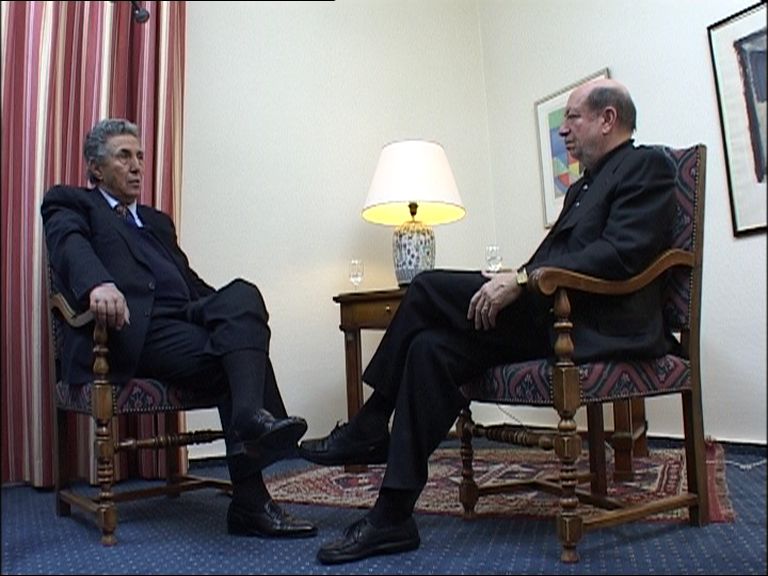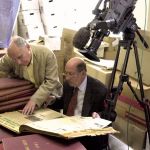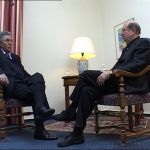Human histories never coincide with stereotypes or ulterior simplifications. Each of the characters in this story has his or her own experience, logic and coherence. The documentary is born, like the events that it relates, from the interaction of these strong individual personalities that Hervé Bourges has met, accompanied or taken a stand against.
First episode: 1956-1962
Everything begins with Témoignage Chrétien, one of the courageous newspapers that carried out their task to serve the truth, even during wartime: the positions adopted by Denise and Robert Barrat, André Mandouze, Mauriac… Hervé Bourges writes his first articles for the paper. Then comes his experience in the field in Algeria: on the base at Aïn Arnat, Private Bourges is in charge of training the young men from the village neighbouring the base. Discovery of the situation of the people, of the reality of colonial Algeria, of the growing influence of the FLN too… The third chapter of this experience of the Algerian War offers a different vision of it: in the office of Edmond Michelet, Minister for Justice, Hervé Bourges follows Algerian affairs, handling the files of the men held in French prisons. From the most obscure prisoners awaiting execution, to the most famous figures, with whom General de Gaulle's government negotiates, the five historic leaders held at the Santé prison in Paris, then on the Ile d'Aix and finally in the Château de Turquant… This third chapter show us the reverse side of the war maps, seen from within the State.
Intervenants épisode 1 :
André MANDOUZE : Chief editor – Témoignage Chrétien Reda MALEK : Chief editor – underground El Moudjahid Nelly FORGET : Assistant to Germaine TILLION for the Social Centres Gisèle HALIMI : Attorney Jacques DUQUESNE : Ecrivain - Journaliste Commandant Jean POUGET : Assistant to Colonel Crespin (Aïn Arnat) Miloud BEGAG : Coordinator at the Sétif social centre Lakhdar BOUZIDI, Salah ABDELLAOUI, Allaoua BOUZIDI, Mustapha FELLAHI, Allaoua TABET : Former members of the Aïn Arnat youth center Meriem Belmihoub ZERDANI : FLN militant Georges SCRIVAT : Prison warder in Algiers Pierre MESSMER Simone VEIL
Maître Mourad OUSSEDIK : Attorney Maître VERGES : Attorney Maître Paul BOUCHET : Attorney Bachir BOUMAZA : Official with the French Federation of the FLN Ahmed BEN BELLA Ali HAROUN : Official with the French Federation of the FLN Bernard STASI : Parliamentary private secretary to the minister Maurice Herzog
André MANDOUZE : Chief editor – Témoignage Chrétien Reda MALEK : Chief editor – underground El Moudjahid Nelly FORGET : Assistant to Germaine TILLION for the Social Centres Gisèle HALIMI : Attorney Jacques DUQUESNE : Ecrivain - Journaliste Commandant Jean POUGET : Assistant to Colonel Crespin (Aïn Arnat) Miloud BEGAG : Coordinator at the Sétif social centre Lakhdar BOUZIDI, Salah ABDELLAOUI, Allaoua BOUZIDI, Mustapha FELLAHI, Allaoua TABET : Former members of the Aïn Arnat youth center Meriem Belmihoub ZERDANI : FLN militant Georges SCRIVAT : Prison warder in Algiers Pierre MESSMER Simone VEIL
Maître Mourad OUSSEDIK : Attorney Maître VERGES : Attorney Maître Paul BOUCHET : Attorney Bachir BOUMAZA : Official with the French Federation of the FLN Ahmed BEN BELLA Ali HAROUN : Official with the French Federation of the FLN Bernard STASI : Parliamentary private secretary to the minister Maurice Herzog
Episode 2: "The trials of power"
The second film is a fresco that relates the tumultuous birth of the Algerian State: everything needs to be organized: what place remains for the population of European origin? How can the Evian agreements be implemented? What fate awaits the Harkis who fought with the French army ? The new Algeria is born in pain and the wrench of exodus, the unleashing of terrorism, civil disorganisation… For the nationalists now in power, after the parenthesis of the "temporary administration" installed at Le Rocher Noir, it's a matter of applying the contradictory ideals that have guided them. The Algerian population discovers the tensions between its leaders and the country splits into antagonistic areas of influence. The rivalry is harsh between Ben Khedda's GPRA, this historical leaders of the FLN and Boumediene's ALN. Hervé Bourges witnesses the gradual take-over of power by Ben Bella who summons him to his side where he will accompany the first years of the new Algerian state, in the front row to observe the developments of the first measures adopted…This allows him to be more than a mere historian today, but an eyewitness
Intervenants épisode 2 :
Roger ROTH : Deputy and Mayor of Philippeville Vice-Chairman of the Algerian constituent assembly
Reda MALEK : Negotiator in Evian
Claude CHEYSSON : Director of the Franco-Algerian body managing the resources of the Saharan subsoil
Pierre MESSMER : Minister for the Armies
Ali HAROUN : Member of the Federal Committee for the French Foundation of the FLN
Commandant Jean POUGET
Bachir BOUMAZA : Minister under Ben Bella and Boumediene
Lakhdar BOUZIDI
Bernard STASI
Monseigneur Henri TEISSIER : Current Archbishop of Algiers
Georges MORIN : Teacher in Constantine following Independence
René VAUTIER : Filmmaker
Mohamed YAZID : GPRA Minister for Information
Maître Mourad OUSSEDIK : Attorney
Amar AZZOUZ : Head of a training college
Nouredine NAIT MAZI : Ancien directeur El Moudjaid
REVUE DE PRESSE
Edito Alain FERRARI-648
I was eager to make Un parcours algérien and I loved making it for three main reasons. Firstly, Algeria has […]
Entretien avec Hervé Bourges et Jean-François Lepetit-649
How did this project come about? Jean-François Lepetit : This may surprise you: Un Parcours algérien was born in Acapulco […]
Edito Alain FERRARI-648
I was eager to make Un parcours algérien and I loved making it for three main reasons.
Firstly, Algeria has held – and continues to hold – an important place in my personal life. I have always felt – and still feel - a great deal of admiration and respect for the people of Algeria, confronted for centuries with the most tragic situations imaginable. In the 20th century, they showed their courage, not only during their struggle for independence but also during the bloody 1990s. The people are still standing, despite the problems of living day to day, despite the massacres. Each new trip to Algeria confirms the admiration and respect that I feel.
The shooting of Un parcours algérien served to strengthen that feeling.
Secondly, the atypical nature of Hervé Bourges's relationship with Algeria. Cinema and television have above all shown us French people who opted for one extreme or another: the "suitcase carriers" or the OAS. Hervé Bourges never adopted such radical positions. But his daily work, inspired by generosity and tolerance, allowed him, with the support of others, notably that of Christian groups, to maintain contacts between both shores of the Mediterranean, maintaining them at all costs both at the height of the "unnamed war" and during the troubled birth of the Algerian nation and state.
Finally, this project obliged me to imagine an original form: two stories knitted together, one subjective – Hervé Bourges's account of his own experience – and the other more global and objective – the story of the period (1958-1965) or rather of certain precise aspects of the period as told by Hervé Bourges and by direct witnesses or actors of the events. And so I went to meet the former students of the youth centre in Aïn Arnat – a centre founded by Hervé Bourges near Sétif in 1958. An unforgettable encounter. Since Hervé Bourges wasn't present, these men were able to speak openly and with the warmth of memory of the influence on their individual lives of this "odd soldier". At the same time, they allowed me to touch the harsh reality of the colonial experience.
Two intermingled accounts, then, that show the ties that have been maintained between the two peoples against all odds. May Un parcours algérien shatter the over-simplification that endures to this day: in this story of noise and fury, it wasn't a mater of good guys against bad guys, or even of good guys against good guys, bad guys against bad guys. On each side, there were men of goodwill. And I have tried to pay tribute to them with this film, without subscribing to the culture of forgetfulness and with an urgent desire for conciliation, thanks to my "guide", Hervé Bourges.
Firstly, Algeria has held – and continues to hold – an important place in my personal life. I have always felt – and still feel - a great deal of admiration and respect for the people of Algeria, confronted for centuries with the most tragic situations imaginable. In the 20th century, they showed their courage, not only during their struggle for independence but also during the bloody 1990s. The people are still standing, despite the problems of living day to day, despite the massacres. Each new trip to Algeria confirms the admiration and respect that I feel.
The shooting of Un parcours algérien served to strengthen that feeling.
Secondly, the atypical nature of Hervé Bourges's relationship with Algeria. Cinema and television have above all shown us French people who opted for one extreme or another: the "suitcase carriers" or the OAS. Hervé Bourges never adopted such radical positions. But his daily work, inspired by generosity and tolerance, allowed him, with the support of others, notably that of Christian groups, to maintain contacts between both shores of the Mediterranean, maintaining them at all costs both at the height of the "unnamed war" and during the troubled birth of the Algerian nation and state.
Finally, this project obliged me to imagine an original form: two stories knitted together, one subjective – Hervé Bourges's account of his own experience – and the other more global and objective – the story of the period (1958-1965) or rather of certain precise aspects of the period as told by Hervé Bourges and by direct witnesses or actors of the events. And so I went to meet the former students of the youth centre in Aïn Arnat – a centre founded by Hervé Bourges near Sétif in 1958. An unforgettable encounter. Since Hervé Bourges wasn't present, these men were able to speak openly and with the warmth of memory of the influence on their individual lives of this "odd soldier". At the same time, they allowed me to touch the harsh reality of the colonial experience.
Two intermingled accounts, then, that show the ties that have been maintained between the two peoples against all odds. May Un parcours algérien shatter the over-simplification that endures to this day: in this story of noise and fury, it wasn't a mater of good guys against bad guys, or even of good guys against good guys, bad guys against bad guys. On each side, there were men of goodwill. And I have tried to pay tribute to them with this film, without subscribing to the culture of forgetfulness and with an urgent desire for conciliation, thanks to my "guide", Hervé Bourges.
Entretien avec Hervé Bourges et Jean-François Lepetit-649
How did this project come about?
Jean-François Lepetit : This may surprise you: Un Parcours algérien was born in Acapulco in the year 2000.
Hervé Bourges had been invited by Daniel Toscan du Plantier as part of the Unifrance delegation to an event designed to promote French cinema in Latin America and in which I played an active part.
I had known Hervé Bourges for a long time, firstly as a staunch supporter of French cinema. His book, De Mémoire d’éléphant, had just been published and he offered me a copy. Everyone knows Hervé Bourges as the chairman of TV channels, the head of the CSA and a media figure. But, in his book, I found another Bourges, an actor in and witness to part of our collective history…
On the flight home, I devoured his book, notably the chapters on Algeria.
On landing in Paris, I suggested producing a documentary on the theme of his "Algerian experience". He accepted in principle but didn't really begin to work on the project until one year after he left the CSA. And we produced the film in 2002.
Why did you focus on Algeria?
Hervé Bourges : Circumstances have made me a privileged witness to half a century of Algerian history. Like the rest of my generation, I was marked by this war that never openly stated its name. As soon as I graduated from the Higher School of Journalism in Lille, I joined Témoignage Chrétien, a weekly whose stand against colonial wars had been permanent since the end of World War Two. Out of loyalty to the values of those who founded it as a resistance paper during the War, the newspaper couldn't bear the idea of seeing the French army as an army "of occupation", even to hold onto a colonial empire that had been conquered long before. The commitment of André Mandouze, the Barrats and Georges Suffert had already been resolute in relation to Morocco. The "Algerian troubles" and, notably, the condemnation of torture were immediately at the heart of our editorial concerns.
But you didn't simply cover them as a reporter…
Hervé Bourges : I was called up, like all the young French men in my generation, and I did my military service in Algeria. This allowed me to discover the reality of Algerian society prior Independence and to perceive the full scope of the incipient conflict. And so, for thirty months, from January 1958 to the summer of 1960, I was a private in a light aviation unit in the army, charged with operational support. My superiors immediately entrusted me with organizational tasks: the army theatre and the training of young people in Aïn Arnat, the town neighbouring the camp. I saw the contrast between conviction and behaviour, for the worse but also for the better. Any judgement of this period and the army's role during it must avoid all over-simplification. This is why I have always strived to avoid caricature. Perhaps I haven’t always been exhaustive, as a perfect historian should be, but I have related what I saw, the good and bad aspects, on both sides.
On your return, you would discover another aspect of the events…
Hervé Bourges : On my return, I discovered the State's action. Summoned to the office of Edmond Michelet, the Minister for Justice, to deal with problems linked to Algeria, I found myself at the heart of a complex power struggle in which the leading lights of Gaullism, Michel Debré and Pierre Mesmer, stuck to a hard line in relation to the evolution of General de Gaulle himself who wanted to bring everyone towards negotiated solution. There, I discovered a whole range of remarkable and brave people: Edmond Michelet himself, Simone Veil, Germaine Tillion, Gisèle Halimi, but also among the Algerian prisoners, Bachir Boumaza, for instance, and the five historic leaders held on the Ile d'Aix before being transferred to Turquant: Boudiaf, Aït Ahmed, Bitat, Khider and, above all, Ben Bella. As their "jailer", I would meet them regularly and acted as their official go-between with the French government in the person of the Minister for Justice… It was an incredible opportunity to be able to observe events amidst the key actors, analysing their moves and helping to bring about a peaceful solution.
Would you still have that opportunity following the Evian agreements? What role would you then play?
Hervé Bourges : In the summer of 1961, Michel Debré managed to oust Edmond Michelet from his government and I returned to Témoignage Chrétien as chief editor. And so I was a journalist throughout this period marked in Paris by the actions of the Chief of Police, Maurice Papon, and, in particular, by the bloody repression of the Algerian demonstrations. Subsequently, the Evian agreements led to a period of total confusion in Algeria, with the last-ditch actions of the OAS and the revelation of the deep-seated divergences within the heart of the Algerian nationalist movement. This confusion led to the gradual emergence of a better-organized centralizing force, the FLN, of which Ben Bella took control, relying on the military force represented by the ALN headed by Colonel Boumediene. As soon as he was in power in Algiers, Ben Bella asked me to work with his government on the process of institutional and political construction that lay ahead. It was a little crazy of me to get involved in this but, at the same time, it was thrilling… And that's how I continued to be a direct and privileged witness to the first years of the new Algerian republic.
What issues did you handle in particular?
Hervé Bourges : I have always attempted to match my actions with my convictions and experience: I handled the training of young people and the preparation of the first generation of Algerian journalists by bringing leading French professionals to Algiers for training courses… As much as possible, I was one of those who tried to keep up the bridge between the two shores of the Mediterranean, despite the violence of the separation. And so I was nominated director for youth and popular education in the office of a certain Abdelaziz Bouteflika and also became an assistant to the Minister for Communications, Bachir Boumaza, who would later be the Chairman of the Algerian Senate… But the turn taken by events, notably after the coup of June 19, 1965, when Boumediene ousted Ben Bella from office, caused me to leave Algeria in 1967 to return to France.
An easy return ?
Hervé Bourges : Of course not! But that's another story. In any case, I've continued to follow events on the other side of the Mediterranean with close attention, even if I returned only rarely until Presidents Chirac and Bouteflika asked me to chair "Djazaïr, Une Année de l’Algérie en France", more than 2,000 cultural events throughout France that allow us to pick up the trail of a conversation that has been interrupted for far too long! I'm particularly happy to be working in this way to strengthen the bonds between France and Algeria, something that I have never ceased doing since that time!
Jean-François Lepetit : This may surprise you: Un Parcours algérien was born in Acapulco in the year 2000.
Hervé Bourges had been invited by Daniel Toscan du Plantier as part of the Unifrance delegation to an event designed to promote French cinema in Latin America and in which I played an active part.
I had known Hervé Bourges for a long time, firstly as a staunch supporter of French cinema. His book, De Mémoire d’éléphant, had just been published and he offered me a copy. Everyone knows Hervé Bourges as the chairman of TV channels, the head of the CSA and a media figure. But, in his book, I found another Bourges, an actor in and witness to part of our collective history…
On the flight home, I devoured his book, notably the chapters on Algeria.
On landing in Paris, I suggested producing a documentary on the theme of his "Algerian experience". He accepted in principle but didn't really begin to work on the project until one year after he left the CSA. And we produced the film in 2002.
Why did you focus on Algeria?
Hervé Bourges : Circumstances have made me a privileged witness to half a century of Algerian history. Like the rest of my generation, I was marked by this war that never openly stated its name. As soon as I graduated from the Higher School of Journalism in Lille, I joined Témoignage Chrétien, a weekly whose stand against colonial wars had been permanent since the end of World War Two. Out of loyalty to the values of those who founded it as a resistance paper during the War, the newspaper couldn't bear the idea of seeing the French army as an army "of occupation", even to hold onto a colonial empire that had been conquered long before. The commitment of André Mandouze, the Barrats and Georges Suffert had already been resolute in relation to Morocco. The "Algerian troubles" and, notably, the condemnation of torture were immediately at the heart of our editorial concerns.
But you didn't simply cover them as a reporter…
Hervé Bourges : I was called up, like all the young French men in my generation, and I did my military service in Algeria. This allowed me to discover the reality of Algerian society prior Independence and to perceive the full scope of the incipient conflict. And so, for thirty months, from January 1958 to the summer of 1960, I was a private in a light aviation unit in the army, charged with operational support. My superiors immediately entrusted me with organizational tasks: the army theatre and the training of young people in Aïn Arnat, the town neighbouring the camp. I saw the contrast between conviction and behaviour, for the worse but also for the better. Any judgement of this period and the army's role during it must avoid all over-simplification. This is why I have always strived to avoid caricature. Perhaps I haven’t always been exhaustive, as a perfect historian should be, but I have related what I saw, the good and bad aspects, on both sides.
On your return, you would discover another aspect of the events…
Hervé Bourges : On my return, I discovered the State's action. Summoned to the office of Edmond Michelet, the Minister for Justice, to deal with problems linked to Algeria, I found myself at the heart of a complex power struggle in which the leading lights of Gaullism, Michel Debré and Pierre Mesmer, stuck to a hard line in relation to the evolution of General de Gaulle himself who wanted to bring everyone towards negotiated solution. There, I discovered a whole range of remarkable and brave people: Edmond Michelet himself, Simone Veil, Germaine Tillion, Gisèle Halimi, but also among the Algerian prisoners, Bachir Boumaza, for instance, and the five historic leaders held on the Ile d'Aix before being transferred to Turquant: Boudiaf, Aït Ahmed, Bitat, Khider and, above all, Ben Bella. As their "jailer", I would meet them regularly and acted as their official go-between with the French government in the person of the Minister for Justice… It was an incredible opportunity to be able to observe events amidst the key actors, analysing their moves and helping to bring about a peaceful solution.
Would you still have that opportunity following the Evian agreements? What role would you then play?
Hervé Bourges : In the summer of 1961, Michel Debré managed to oust Edmond Michelet from his government and I returned to Témoignage Chrétien as chief editor. And so I was a journalist throughout this period marked in Paris by the actions of the Chief of Police, Maurice Papon, and, in particular, by the bloody repression of the Algerian demonstrations. Subsequently, the Evian agreements led to a period of total confusion in Algeria, with the last-ditch actions of the OAS and the revelation of the deep-seated divergences within the heart of the Algerian nationalist movement. This confusion led to the gradual emergence of a better-organized centralizing force, the FLN, of which Ben Bella took control, relying on the military force represented by the ALN headed by Colonel Boumediene. As soon as he was in power in Algiers, Ben Bella asked me to work with his government on the process of institutional and political construction that lay ahead. It was a little crazy of me to get involved in this but, at the same time, it was thrilling… And that's how I continued to be a direct and privileged witness to the first years of the new Algerian republic.
What issues did you handle in particular?
Hervé Bourges : I have always attempted to match my actions with my convictions and experience: I handled the training of young people and the preparation of the first generation of Algerian journalists by bringing leading French professionals to Algiers for training courses… As much as possible, I was one of those who tried to keep up the bridge between the two shores of the Mediterranean, despite the violence of the separation. And so I was nominated director for youth and popular education in the office of a certain Abdelaziz Bouteflika and also became an assistant to the Minister for Communications, Bachir Boumaza, who would later be the Chairman of the Algerian Senate… But the turn taken by events, notably after the coup of June 19, 1965, when Boumediene ousted Ben Bella from office, caused me to leave Algeria in 1967 to return to France.
An easy return ?
Hervé Bourges : Of course not! But that's another story. In any case, I've continued to follow events on the other side of the Mediterranean with close attention, even if I returned only rarely until Presidents Chirac and Bouteflika asked me to chair "Djazaïr, Une Année de l’Algérie en France", more than 2,000 cultural events throughout France that allow us to pick up the trail of a conversation that has been interrupted for far too long! I'm particularly happy to be working in this way to strengthen the bonds between France and Algeria, something that I have never ceased doing since that time!







